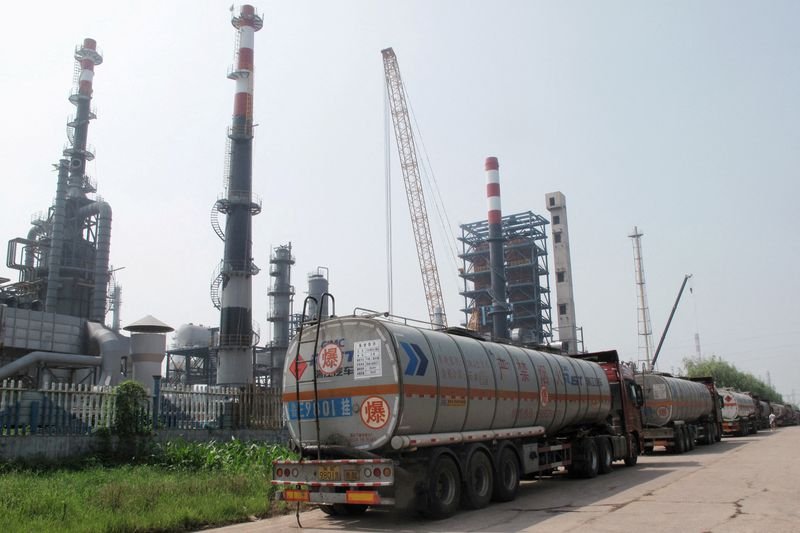China 'teapot' refiners halt plants as new fuel tax bites, sources say
Published by Global Banking & Finance Review®
Posted on January 27, 2025
3 min readLast updated: January 27, 2026

Published by Global Banking & Finance Review®
Posted on January 27, 2025
3 min readLast updated: January 27, 2026

Several Chinese teapot refiners halt operations due to new tax policies, impacting costs and fuel oil demand.
By Chen Aizhu and Trixie Yap
SINGAPORE (Reuters) - Several independent oil refineries in eastern China have halted operations, or plan to do so, for indefinite maintenance periods as new Chinese tariff and tax policies plunge them deeper into losses, refinery and trade sources said.
The rare outages come at a time of nascent consolidation in the world's second-largest oil refining industry as an earlier-than-expected peak in Chinese fuel demand and Beijing's drive to wring out inefficiency starts to squeeze out the weakest of the small independent plants, known as teapots.
At least four plants with a combined annual processing capacity of approximately 18 million metric tons, or 320,000 barrels per day, either closed crude oil distillation units (CDUs) this month or plan to in February after Beijing cut rebates on consumption tax paid for feedstock imports, the sources said.
The plants, all situated in the refining hub of Shandong province, include facilities operated by Shandong Shangneng Group, Kelida Petrochemical, Wonfull Petrochemical and China Overseas Energy Technology (Shandong), according to sources familiar with the situation.
None of the companies have government-granted crude import quotas, limiting their feedstock options and making them less competitive than rivals. Instead, they process straight-run fuel oil, a semi-refined product, or a tar-like heavy residue called bitumen blend, into transportation fuels or asphalt.
At the start of 2025, China raised import tariffs for fuel oil and enforced changes to tax rebates.
"Under the new policy, it's very hard for plants to sustain production," said one manager, declining to be named due to company policy.
His plant, which had been operating at 20% capacity since November after running at a loss for 18 months, has no date to resume operations, the manager added.
The other plants operated at about 50% capacity on average before the policy changes, one industry source estimated.
None of the four responded to requests for comment.
Under the new tax regime, refiners receive rebates at roughly 50%-80% of the 1,218 yuan ($167.18) per metric ton consumption tax paid for feedstock imports, compared with full rebates previously.
That effectively raised feedstock costs by $33-$83 per ton, or $5, to $12.8 per barrel, causing losses of 300 to 600 yuan per ton, as estimated by three industry trading managers.
The stoppages are dampening demand for straight-run fuel oil, leading to lower premiums of Russia's straight-run fuel oil blend M100, which traders last pegged at around $50 per ton over benchmark Singapore 380-cst quotes on delivered basis, down more than $10 from December.
Prices for bitumen blend, mostly sourced from Venezuela and trans-shipped near Malaysia, however, have held relatively stable at benchmark ICE Brent oil minus $7 per barrel for March arrivals into Shandong, supported by enquires from plants with crude quota but wary of increasingly costly Iranian or Russian oil due to tighter U.S. sanctions, several traders said.
(1 ton = 6.5 barrels for fuel oil, bitumen blend conversion)
($1 = 7.2857 Chinese yuan renminbi)
(Reporting by Chen Aizhu and Trixie Yap; Editing by Tony Munroe and Louise Heavens)
Several independent oil refineries in eastern China have halted operations due to new tariff and tax policies that have significantly increased feedstock costs.
At least four plants with a combined annual processing capacity of approximately 18 million metric tons have either closed or are planning to close.
Under the new tax regime, refiners now receive rebates at roughly 50%-80% of the consumption tax paid for feedstock imports, compared to full rebates previously.
The stoppages are dampening demand for straight-run fuel oil, leading to lower premiums for Russia's fuel oil blend, while prices for bitumen blend have remained stable.
The affected refineries do not have government-granted crude import quotas, which limits their feedstock options and makes them less competitive compared to their rivals.
Explore more articles in the Headlines category

